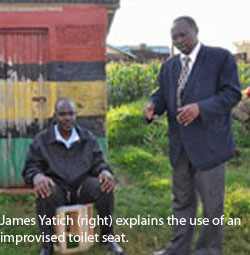Kenya – WASH Training Spurs Innovative Local Solution
James Yatich, a public health officer in Kenya’s Central province, has been supporting frontline community health workers involved in home-based care for people living with HIV.
James realized that bedridden clients who could not use the toilet on their own posed a major challenge. “When I told them that they had to use the toilet to prevent diarrhoea, they asked me how?” 
In June 2012 James finally found a solution after attending a WASH-HIV integration training workshop organized for government public health officers under the USAID-funded WASHplus project. During the training, participants learned about the small doable action approach and supportive technologies to improve water, sanitation and hygiene practices.
Small doable actions are incremental, feasible steps to improve practices. Using knowledge acquired from the training, James returned home and started working on the design of a simple aid to help bedridden patients and the elderly “go to the toilet” in a dignified way. The result was a home-made commode that can be made from locally available materials and yet ensure proper disposal of faecal waste.
“I sketched a design and asked a carpenter to make one piece for demonstration,” says James. “We used mainly left-over pieces of wood and furniture and the cost came to just 200 shillings (about US$ 2.50). But the cost can be negligible if the materials are available in homesteads.”
The improvised seat is placed where the patients can easily reach it and lined with disposable plastic paper bags that are readily available. It can be used by bedridden clients and the elderly, especially those who are overweight and cannot easily be supported by others.
“We don’t see very many bedridden patients, but even one such patient can pose a big challenge to the family and needs assistance,” says James.
According to James, the technology gives patients independence and dignity as they do not need a caregiver to hold them on the toilet seat. It also allows the caregiver to do other chores rather than take the patient to the toilet – which can frequent for patients with diarrhea.
Asked why he had not thought of the solution earlier, James says: “It could not have been developed earlier because we were not able to conceptualise the link relationship between hygiene and HIV until we went for the training.”
James now wants to share his idea and is looking to work with local stakeholders to train community health workers how to make the portable toilet seats for their clients.
Central Provincial Public Health Officer Samuel Muthengi says the region has high latrine coverage at 97 per cent but usage is a challenge for bedridden patients and the elderly. If such a simple technology is replicated, it can help improve disposal of fecal waste.
- See additional photos – Kenya: Simple commodes for HIV/AIDS patients and others


